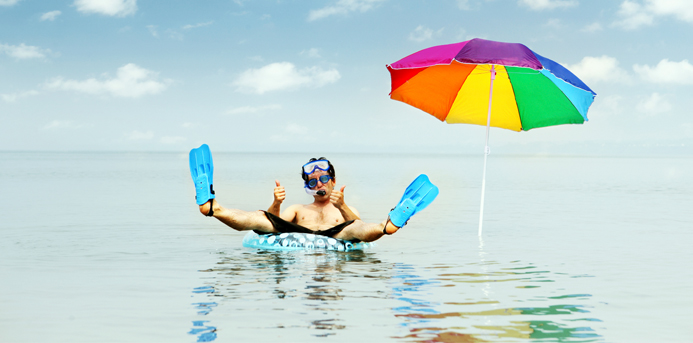This past winter was rough in many respects, including on our skin.
While chapped lips and cracked hands may be distant memories, the warm weather can bring new skin concerns.
“Summer is better for dry skin,” says Dr. Ross Levy, M.D., a dermatologist from NorthShore University HealthSystem. “People with itchy, scratchy skin will see it improve.”
In addition to that good news, Dr. Levy offers this warm-weather skin-care advice.
Don’t Sweat It
“Perspiring is a good thing,” Levy explains. “It’s the body’s way of cooling itself. While people don’t like it, if you didn’t do it, you would die pretty quickly.”
Hyperhidrosis is a condition that involves excessive sweating, but Levy says, “It is not related to heat and it happens year round. Treatments for it range from prescription deodorants to Botox.”
For normal sweating, other than staying in a cool and dry environment and wearing cool clothes, “there’s not much you can do.”
Keep Your Cool
Staying in a dry, cool environment can also help prevent heat rash, which is generally a condition seen primarily in the summer here.
“With more humidity and moisture, there can be higher instances of skin-fungal reactions that come with moist environments,” Levy says. To prevent those, he recommends staying in cool places and ensuring that clothing is dry.
Cover Up
Dr. Levy says that clothing is important when it comes to protecting yourself from the sun, too.
“Most people are good and wear sunscreen, but you need to reapply sunscreen every two hours for it to be effective,” he says. “That’s difficult for a lot of people. I try to push my patients more toward wearing sun-preventive clothing, such as wide-brim hats, long-sleeve shirts, long pants. Some clothing even has UV protection in it.”

Find product descriptions and pricing here.
Protect Your Eyes
“I see a lot of skin cancer on the eyelids and in the areas around the eyes,” he says.
He notes that most sunglasses offer protection from ultraviolet (UV) rays, which he says is important for not only the skin but also the eyes. Some contacts also offer UV protection. In addition to damaging the skin around the eyes, UV radiation exposure can increase the likelihood of certain cataracts.
Water Worries
Swimming pools can dry out hair and skin. “Chlorine is an irritant,” Levy says. “In some dilute amounts, it can be good. We actually use it for patients that have bad eczema. But for most people it can be drying.”
Showering after swimming should reduce the irritation.
Another concern is the condition hot tub folliculitis, an irritation of hair follicles caused by bacteria from hot tubs.
Made in the Shade
Levy notes that being at the beach or on the water means sun can burn quickly and requires extra vigilance due to the reflection of the sun by the sand or water. This almost doubles sun exposure, which can result in quick sunburn.
“Be extra careful, and sunscreen isn’t going to do it,” Levy says. “Find places that are shady.”
“People are going to be hitting the beaches pretty hard after the brutal winter. Unless they want to be good friends with me, a skin-cancer surgeon, they should wear sunscreen and protect themselves from the sun as much as possible.”

